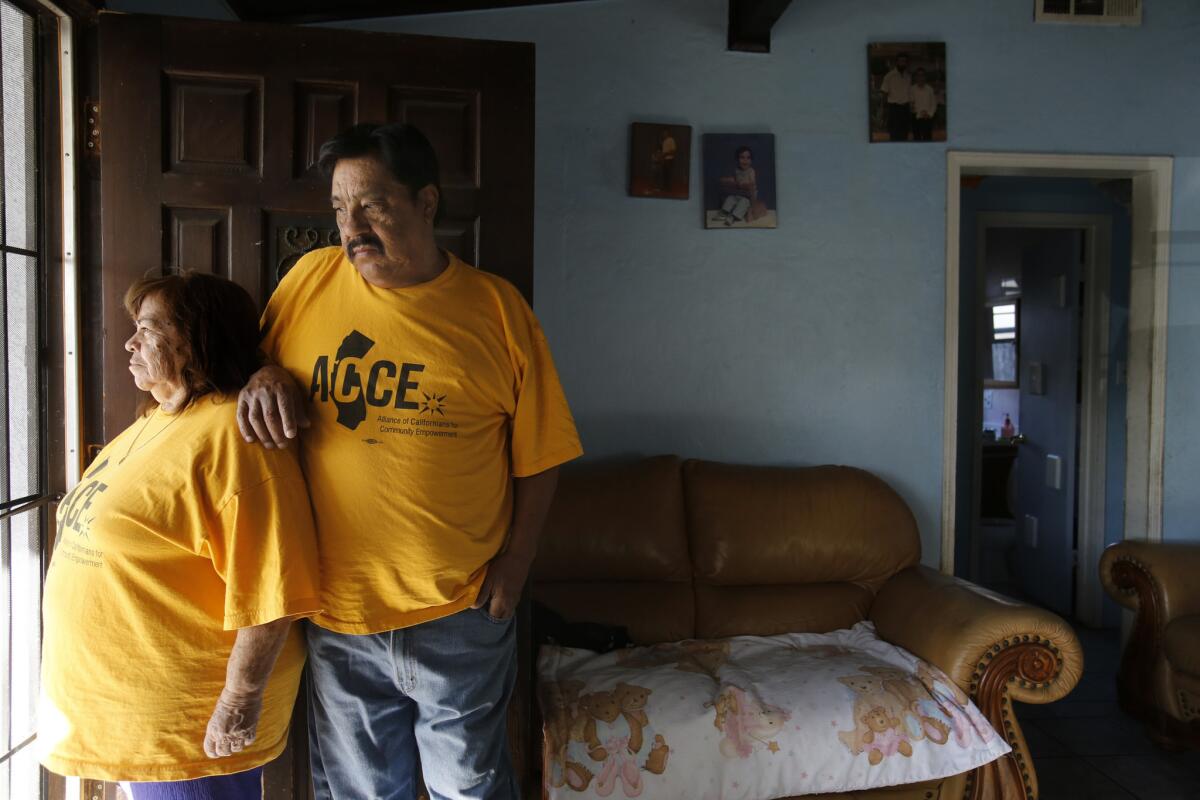Regulator OKs some Fannie, Freddie foreclosure buybacks at fair value

Fannie Mae and its federal regulator set a precedent by allowing Jaime and Juana Coronel of Azusa (above) to buy back the home they lost to foreclosure in 2010 at its current market value.
- Share via
The federal regulator overseeing Fannie Mae and Freddie Mac will now allow certain foreclosed borrowers to buy back the homes they lost — so long as they pay the full current value of the property.
The new policy would benefit the housing market by increasing demand for distressed homes, the Federal Housing Finance Agency said Tuesday in announcing the change.
It also effectively lowers the principal on loans, something the agency has pointedly refused to do in the past. Previously, the agency had required such borrowers to pay the entire debt they owed, even if it was much more than the property’s current value.
“This is a targeted, but important policy change that should help reduce property vacancies and stabilize home values and neighborhoods,” said FHFA Director Melvin L. Watt.
Under the changes, the former homeowners must wait at least three years after their foreclosures, as they would have to do to buy any other home using a loan guaranteed by Fannie Mae and Freddie Mac. The home must have been the buyers’ primary residence; second homes and investor properties are ineligible.
Fannie and Freddie don’t lend directly to homeowners, but they guarantee payments to investors in mortgage bonds. They thus wind up on the hook if borrowers default.
The policy shift already was apparent in the case of an Azusa couple, Jaime and Juana Coronel, who last month were allowed to repurchase a home they lost in 2010 when Fannie Mae foreclosed.
The Coronels had defaulted on more than $400,000 they owed after a series of ever-larger mortgage refinancings.
The Times reported last week that Fannie Mae, which had allowed the couple to stay in the home as renters for four years, had sold the home back to them for its newly appraised market value of $280,000.
The repurchases amount to an indirect reduction in mortgage principal for the buyers.
The FHFA has refused to allow modifications on distressed loans to include debt forgiveness, drawing protests from critics who say Fannie and Freddie would come out ahead financially by cutting the amount owed on certain loans.
A coalition of Democratic attorneys general, including Kamala Harris of California and Martha Coakley of Massachusetts, made the case in a 2013 letter to President Obama, saying:
“It is far more profitable for any financial institution to hold a portfolio of performing $200,000 mortgages that keeps families in their homes than a portfolio of non-performing $250,000 mortgages headed toward default.”
But debt forgiveness remains unpopular with many Americans who argue that it rewards undeserving borrowers and encourages people who could pay their loans to default in order to have their debts lowered.
They also argue that such relief is simply unfair to borrowers current on their loans.
Follow @ScottReckard for news of banks and home loans
More to Read
Inside the business of entertainment
The Wide Shot brings you news, analysis and insights on everything from streaming wars to production — and what it all means for the future.
You may occasionally receive promotional content from the Los Angeles Times.











